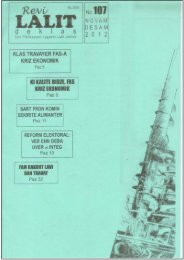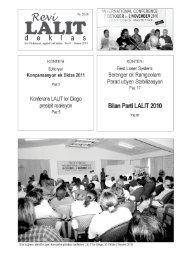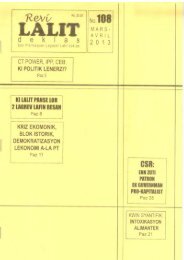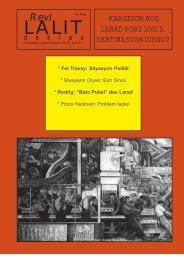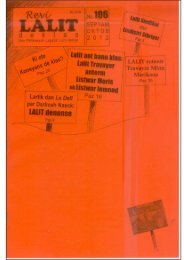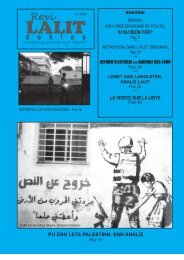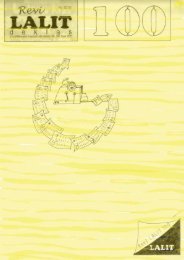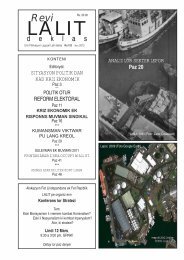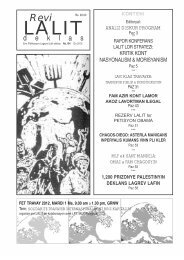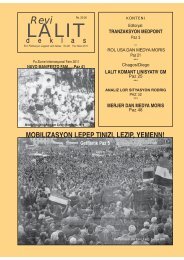Against communalism of the best-loser system - Lalit Mauritius
Against communalism of the best-loser system - Lalit Mauritius
Against communalism of the best-loser system - Lalit Mauritius
You also want an ePaper? Increase the reach of your titles
YUMPU automatically turns print PDFs into web optimized ePapers that Google loves.
EXCERPTS ON THE BEST LOSER SYSTEM<br />
FROM THE SACHS REPORT<br />
Mr. Albie Sachs chaired <strong>the</strong> “Commission on Constitutional and Electoral Reform<br />
2001/02”, and in his Report he made <strong>the</strong> following references to <strong>the</strong> Best Loser<br />
System. Although <strong>Lalit</strong> does not agree with many <strong>of</strong> <strong>the</strong> assumptions and proposals<br />
made by Mr. Sachs, we do think it worth putting on record what he had to say about <strong>the</strong><br />
Best Loser System:<br />
“No issue before us aroused more intense comment. The great majority <strong>of</strong> deponents criticized <strong>the</strong> BLS<br />
[Best Loser System] vehemently. They pointed out that it formally introduced elements <strong>of</strong> <strong>communalism</strong><br />
into <strong>the</strong> Constitution and violated <strong>the</strong> very essence <strong>of</strong> developing Mauritian citizenship; that it was based<br />
on four communities identified nearly forty years ago on an arbitrary basis which no underlying presentday<br />
sociological rationale; that calculations for <strong>the</strong> appointment <strong>of</strong> BLS were based on 1972 figures<br />
which were completely out <strong>of</strong> date; that results in individual cases have turned out to be irrational and<br />
paradoxical.” (...)<br />
“The degree <strong>of</strong> correction to community balance which <strong>the</strong> BLS provides accordingly tends to be<br />
tangential ra<strong>the</strong>r than substantive. A second significant development since <strong>the</strong> introduction <strong>of</strong> BLS has<br />
been <strong>the</strong> upsurge <strong>of</strong> a strong pan-<strong>Mauritius</strong> political consciousness which has reflected itself in <strong>the</strong><br />
elimination from <strong>the</strong> census <strong>of</strong> any reference to community, religion or ethnicity. By being based fairly<br />
and squarely on community and religious identification, <strong>the</strong> BLS finds itself isolated and stranded as an<br />
uncomfortable relic <strong>of</strong> an earlier era. The degree <strong>of</strong> reassurance it provides is more <strong>of</strong> a symbolical and<br />
emotional nature than a practical one. Such comfort as it <strong>of</strong>fers comes at <strong>the</strong> price <strong>of</strong> it appearing as odd<br />
and anachronistic to <strong>the</strong> very security it was designed to <strong>of</strong>fer. It carries with it <strong>the</strong> real danger <strong>of</strong><br />
marginalizing from <strong>the</strong> rest <strong>of</strong> society those identified with it so that what started <strong>of</strong>f as intended to be a<br />
protection could end up becoming an impediment.” (...)<br />
“It will be noted that international human rights law does not give minority groups <strong>the</strong> right to receive<br />
special treatment in terms <strong>of</strong> laws concerning <strong>the</strong> enjoyment <strong>of</strong> citizenship. Outside <strong>of</strong> <strong>the</strong> sphere <strong>of</strong><br />
affirmative action, <strong>the</strong>re has been a general move away from electoral arrangements based upon direct<br />
representation <strong>of</strong> groups in <strong>the</strong> legislature. In South Africa, with its intense and historically created<br />
minority concerns, <strong>the</strong> electoral <strong>system</strong> is completely free <strong>of</strong> overt references to race or ethnicity.<br />
Minority concerns were met by having an entrenched Bill <strong>of</strong> Rights that gave extensive recognition to <strong>the</strong><br />
principles mentioned above. These were reinforced by sunset clauses guaranteeing political powersharing<br />
<strong>of</strong> parties (not races) for a limited period. A considerable degree <strong>of</strong> federalism also helped allay<br />
fears. None <strong>of</strong> <strong>the</strong>se measures expressly invoked race or ethnicity. On <strong>the</strong> o<strong>the</strong>r hand, <strong>the</strong>re are some<br />
consociational states, such as Belgium, where <strong>the</strong> creation <strong>of</strong> language zones has been foundational to <strong>the</strong><br />
structure <strong>of</strong> government and <strong>the</strong> exercise <strong>of</strong> rights. In Singapore <strong>the</strong> electoral <strong>system</strong> has been constructed<br />
in such a way as to require a certain communal balance. We are unaware, however, <strong>of</strong> any country where<br />
after <strong>the</strong> results <strong>of</strong> a non-ethnic poll are declared, ethnic considerations are introduced to top-up <strong>the</strong><br />
representation <strong>of</strong> communities considered to be under-represented.” (...)<br />
“There can be no doubt that not only can <strong>the</strong> BLS not claim support from international human rights<br />
principles, its continued existence jars severely against <strong>the</strong> general spirit <strong>of</strong> <strong>the</strong> Mauritian Constitution.<br />
The Constitution enshrines political rights in a manner that does not refer to community or religion. It<br />
goes much fur<strong>the</strong>r, however. It structures itself around an electoral <strong>system</strong> designed expressly to<br />
encourage <strong>the</strong> creation <strong>of</strong> parties that draw <strong>the</strong>ir support from voters belonging to all communities. The<br />
evidence we received made it clear that in practice <strong>the</strong> parties pay careful attention to producing balanced<br />
tickets so as to appeal to voters from all communities. This reflects itself in <strong>the</strong> diversity <strong>of</strong> members<br />
chosen through <strong>the</strong> bloc-<strong>of</strong>-three <strong>system</strong>.” (...)<br />
“It is <strong>the</strong> opinion <strong>of</strong> <strong>the</strong> Commission that <strong>the</strong> BLS has outlived its original purpose and in fact is<br />
increasingly becoming counter-productive.”



